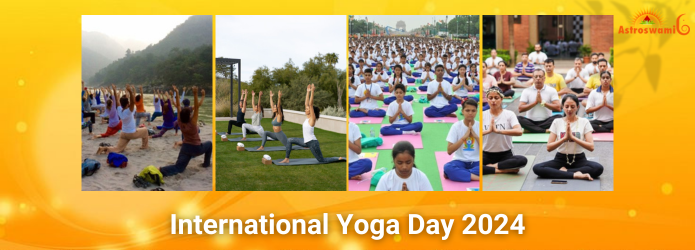
International Yoga Day, celebrated annually on June 21st, is a global event that highlights the numerous benefits of yoga, a physical, mental, and spiritual practice that originated in ancient India. Established by the United Nations in 2014, this day has grown into a worldwide phenomenon, uniting millions of people across different cultures and backgrounds in a shared commitment to health and harmony. As we approach International Yoga Day 2024, it is an opportune moment to reflect on the significance of this practice and its impact on individual well-being and global health.
Yoga, derived from the Sanskrit word 'Yuj,' meaning 'to unite' or 'to join,' is an ancient practice that integrates physical postures, breathing exercises, meditation, and ethical principles. Rooted in the philosophical traditions of Hinduism, Buddhism, and Jainism, yoga aims to achieve a balanced state of body, mind, and spirit. The earliest references to yoga can be found in the Rigveda, a collection of ancient Indian hymns dating back over 5,000 years.
Throughout history, yoga has evolved, absorbing influences from various cultures and traditions. The classical period of yoga, marked by the composition of the Yoga Sutras by the sage Patanjali, laid the foundational principles of modern yoga practice. In the 20th century, yoga gained international popularity, thanks to the efforts of pioneering yogis like Swami Vivekananda and B.K.S. Iyengar, who introduced yoga to the Western world.
The proposal for International Yoga Day was first introduced by the Indian Prime Minister, Narendra Modi, during his speech at the United Nations General Assembly on September 27, 2014. He emphasized yoga's universal appeal and its potential to promote global health and peace. The resolution received overwhelming support, with 177 member states co-sponsoring it, and on December 11, 2014, the United Nations officially declared June 21st as International Yoga Day.
June 21st, the longest day of the year in the Northern Hemisphere, holds special significance in many cultures and is considered an auspicious day in yoga. The first International Yoga Day was celebrated on June 21, 2015, with millions of people participating in yoga sessions worldwide. Since then, it has become an annual tradition, fostering a global movement for health and well-being.
Each year, International Yoga Day is celebrated with a specific theme that highlights different aspects of yoga and its relevance to contemporary issues. The themes aim to address global challenges, promote sustainable development, and enhance the understanding of yoga's holistic benefits. Previous themes have included "Yoga for Health," "Yoga for Peace," and "Yoga for Climate Action."
In 2024, the theme for International Yoga Day is "Yoga for Mental Well-being." This theme underscores the growing recognition of mental health as a critical component of overall health. The COVID-19 pandemic has exacerbated mental health issues globally, highlighting the need for effective strategies to manage stress, anxiety, and depression. Yoga, with its emphasis on mindfulness, relaxation, and emotional regulation, offers valuable tools for enhancing mental well-being.
Celebrations for International Yoga Day 2024 will include a variety of events and activities, both online and offline. Governments, non-profit organizations, yoga studios, and community groups will organize mass yoga sessions, workshops, seminars, and cultural performances. Virtual platforms will host live-streamed yoga classes, guided meditations, and discussions with renowned yoga practitioners and mental health experts. Social media campaigns will encourage people to share their yoga experiences and promote the benefits of yoga for mental health.
The benefits of yoga extend beyond physical fitness, encompassing mental and emotional well-being. Numerous scientific studies have demonstrated the positive effects of yoga on various health outcomes. Regular yoga practice has been shown to improve flexibility, strength, and balance, reduce chronic pain, and enhance cardiovascular health. Moreover, yoga has been found to lower stress levels, alleviate symptoms of anxiety and depression, and improve sleep quality.
One of the key mechanisms through which yoga benefits mental health is its impact on the autonomic nervous system. Yoga practices, such as pranayama (breathing exercises) and meditation, activate the parasympathetic nervous system, promoting relaxation and reducing the body's stress response. This leads to a decrease in the levels of stress hormones, such as cortisol, and an increase in the production of endorphins and other mood-enhancing neurotransmitters.
Additionally, yoga's emphasis on mindfulness and present-moment awareness helps individuals develop a greater sense of self-awareness and emotional regulation. By fostering a non-judgmental attitude towards one's thoughts and feelings, yoga can reduce rumination and negative thinking patterns, which are often associated with anxiety and depression. Furthermore, the social aspect of group yoga classes can provide a sense of community and support, enhancing overall well-being.
One of the most remarkable aspects of yoga is its accessibility. Yoga can be adapted to suit individuals of all ages, fitness levels, and physical abilities. From children to seniors, everyone can benefit from yoga's holistic approach to health. Various styles of yoga, such as Hatha, Vinyasa, Ashtanga, Iyengar, and Restorative yoga, offer different levels of intensity and focus, allowing practitioners to choose a practice that aligns with their needs and preferences.
For children, yoga can be a fun and engaging way to develop physical coordination, concentration, and emotional resilience. Schools around the world are incorporating yoga into their curricula to promote students' overall well-being and academic performance. For adults, yoga can be a valuable tool for managing stress, improving work-life balance, and enhancing physical and mental health. Seniors can benefit from gentle yoga practices that improve mobility, balance, and flexibility, reducing the risk of falls and enhancing quality of life.
In the digital age, technology has played a significant role in making yoga accessible to a global audience. Online platforms, mobile apps, and social media have revolutionized the way people learn and practice yoga. Virtual classes and guided sessions have made it possible for individuals to practice yoga from the comfort of their homes, breaking down geographical barriers and reaching diverse populations.
During the COVID-19 pandemic, the demand for online yoga resources surged as people sought ways to stay active and manage stress during lockdowns. This trend has continued, with many yoga instructors and studios offering hybrid models that combine in-person and virtual classes. The convenience and flexibility of online yoga have made it an attractive option for busy individuals, allowing them to integrate yoga into their daily routines.
International Yoga Day 2024 is not just a celebration of a physical practice; it is a reminder of the profound impact yoga can have on our mental, emotional, and spiritual well-being. As we embrace this year's theme, "Yoga for Mental Well-being," we are reminded of the importance of nurturing our mental health in a world that is increasingly demanding and stressful. Yoga offers a pathway to inner peace, resilience, and holistic health, empowering individuals to lead healthier and more balanced lives.
As we join millions of people around the world in celebrating International Yoga Day 2024, let us commit to integrating the principles of yoga into our daily lives. Whether through a few minutes of meditation, a morning yoga session, or simply practicing mindfulness in our daily activities, we can all benefit from the transformative power of yoga. In doing so, we contribute to a global movement that promotes health, harmony, and well-being for all.

Many festivals are celebrated in India and Shardiya Navratri festival has a great historical background....

The mind is represented by moon, its placement, condition and afflictions in the birth chart. ...

Sawan Shivratri 2022 - Holy month of Sawan is going on. This month, Shivaratri is considered special....

Tirupati Balaji Temple is one of the richest temples located in Andhra Pradesh....